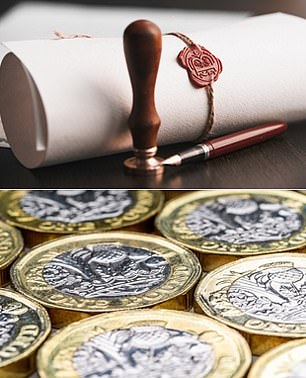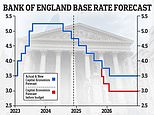My ex-boyfriend plans to leave me his £2m estate and I'm worried about a huge inheritance tax bill

If I am named as paying the inheritance tax on my ex-boyfriend's estate in his old will, can I refuse?
If I am named as paying the inheritance tax on my ex-boyfriend's estate in his old will, can I refuse on the grounds we split up 19 years ago?
We never married or lived together. Can a solicitor get access to his bank accounts and savings to pay inheritance tax directly to HMRC prior to probate being issued?
The background is that approximately 25 years ago we made mirror wills - I have updated mine.
I still have a copy of his and he's told me (we are just friends now - he's still alive) that he hasn't.
He's notorious for not doing these things, despite my telling him he needs to redo his will!
Obviously, he hasn't got a financial power of attorney either.
In the last few years, he has retired and both his parents have died. So, he is now worth about £2million.
He is single, never married or had children, so his inheritance tax is going to be huge. I will not have the money to pay this.
In the event that I outlive him, what are my options please? I've even wondered if it would be better to let his estate go intestate?
SCROLL DOWN TO FIND OUT HOW TO ASK HEATHER YOUR TAX QUESTION
Heather Rogers replies: It sounds from what you say as if your ex-boyfriend has named you as executor in his will, and as you mention 'mirror wills' he is most probably leaving you his entire estate too.
Being named in a will as an executor, either on your own or with others - collectively known as the 'personal representatives' - can be a daunting prospect, even if you also happen to be a beneficiary.
If your ex-boyfriend does not change his will, and if he dies before you - both still two very big ifs at this stage - please be reassured that you will not be bankrupted by an inheritance tax bill.
There are steps you can take to deal with the inheritance tax, whether you are the executor only or the ultimate beneficiary of this estate as well after the bill has been paid.
Below, I will explain the job of an executor, and how inheritance tax can be handled if there is not enough money to pay it upfront, before probate is granted to access the assets in an estate.
What does an executor do?
When someone dies, the executors who are named in the will are responsible for valuing the assets at the date of death and also dealing with the administration of the estate, collecting monies owed to it and paying bills owed by it and selling assets - they should get the best price they can within reason.
They are responsible for paying any inheritance tax due and obtaining a Grant of Probate which gives them authority to administer the estate and distribute the assets to the beneficiaries.
Until the Grant of Probate is issued, the estate is frozen. The executors must always be independent and not take sides, if there is a challenge to the will for example.
If there is no will, and a person therefore dies 'intestate', then the court will appoint someone, often a close relative, who is known as an 'administrator' rather than an executor.
You cannot make an estate 'intestate' if there is a valid will.
Executors are usually family members, trusted friends, a firm of solicitors, or a combination of the above.
In your circumstances, where you are concerned about the burden involved, you can consider the following options.
Getting professional help: When it comes to doing the work, an executor can delegate their responsibilities to a solicitor or other professional if they wish, while still remaining as an executor.
This is often preferable to handling the matter yourself, especially if you are the only executor named. This removes a lot of the stress.
Complex estates often require the assistance of a solicitor in any case.
The solicitors' fees will be paid out of the estate, but are not normally tax deductible, so will not reduce the inheritance tax liability.
If there is more than one executor, they are supposed to act jointly unless one is authorised by the others to act on their behalf.
Renouncing the role: If you find out you are named an executor by someone and don't want to do it, you can renounce your role after they die but only if you do this immediately, before undertaking any of the work.
However, if you want to renounce your role, seek legal advice before you do this - sometimes there may be a legacy dependent clause in the will.
When there is more than one executor, one or more of them may wish to relinquish their role.
Should you be concerned about being appointed executor?
Being an executor is not a role that should be taken lightly.
HEATHER ROGERS ANSWERS YOUR TAX QUESTIONS

- Do I have to pay CGT because I mistakenly undervalued a house for probate?
- How can we cut our controlling, greedy son-in-law out of inheritance AND avoid tax?
- Can parents dodge Labour's VAT on private school fees by paying in advance?
- I've done up a wreck of a house and doubled its value - how can I cut my tax on profits?
- My ex-boyfriend plans to leave me his £2m estate and I'm worried about a huge inheritance tax bill
- How do you find a good accountant? Five tips on when to seek help, hiring the right firm and typical costs
If errors occur then the executor can be personally liable for any underpaid tax if all the assets have been distributed, or if a beneficiary is missed or the wrong beneficiary is paid, for example.
Additionally, they are also personally responsible for paying the inheritance tax due on the estate to HMRC.
Inheritance tax is due by the end of the sixth month after the date of death of the deceased.
Probate cannot be granted until the tax is paid, which seems a bit backwards!
How do you pay the inheritance tax if the estate is frozen and you can't administer the assets.
Fortunately, there are some options, and again, having a solicitor on board can help you make the right decisions.
What if executors don't have the cash to pay inheritance tax?
The Direct Payment Scheme: If the estate is liable for inheritance tax, you can use cash in the deceased's bank accounts, and other investments, including national savings (NS&I), investment bonds or their government gilts/stock, to pay all or part of it using the Direct Payment Scheme to HMRC directly from their accounts.
Sometimes cash can be released from an investment portfolio as well.
The details of the Direct Payment Scheme are here, and it also covers paying inheritance tax in detail.
As an aside, for anyone struggling with funeral costs, these can also normally be paid from the deceased's account. Contact their bank directly.
Paying in instalments: If the remaining assets are non-cash assets, for example property, shares, or a business, then inheritance tax can be paid over 10 years in equal instalments, if the personal representative can show paying in one lump would cause hardship.
The first instalment would be due at the end of the six months following the death. Interest will be charged on the second instalment onwards.
The inheritance tax can be paid in full at any time to avoid interest charges to the estate. Once a large asset like a property is sold that allows it to be paid in full, it must be settled.
Borrow to cover the bill: You can take out a commercial loan, using the estate assets as collateral (advice from a financial adviser should be sought before doing this).
You can also apply for a Grant on Credit from HMRC, which means you can postpone all or some of the tax that you can't pay until you have sold the assets. Interest is chargeable.
More information on Grant on Credit can be found here.
Since April this year, you don't have to apply for a commercial loan first. Until then, HMRC would usually issue a Grant on Credit only as a last resort, if no other way could be found to pay the tax.
Taking out insurance: If you think your ex might be willing, you could ask him to buy a life insurance policy that is written into trust - and therefore does not form part of his estate - so the payout can be used to cover the inheritance tax bill.
He should speak to a solicitor, financial planner, or tax specialist before doing this, and also take the opportunity to talk to them about inheritance tax planning more generally.
Divert some of the estate to charity: One more thing to be aware of is that if 10 per cent of the deceased's estate is left to charity, then the inheritance tax rate reduces to 36 per cent.
If you are a beneficiary and can redirect enough of your legacy to a charity under a 'deed of variation' to allow the estate to benefit, then this would reduce the overall inheritance tax bill. I explained how deeds of variation work here.
In conclusion: What to think about now
As I said, there is no certainty you will have to deal with any of the above.
I don't have sight of the will, but if you are named as both executor and a beneficiary and you do have to act, here is a summary of my main points.
- Unless your former boyfriend's will is deemed invalid (probably unlikely), it will stand
- I would appoint a solicitor to assist you in your role as executor – this will remove the worry, and their bill can be met out of the estate
- Any cash in the bank accounts or investments can be used to pay the inheritance tax bill using the Direct Payment Scheme
- You can apply to use the Grant on Credit to postpone the tax
- Or, you can take a loan or pay in instalments as I have outlined.
Hopefully, this has put your mind at rest that if it becomes necessary the job of being an executor will be manageable, and if not then you can delegate or renounce it if you prefer.
And finally, if your ex-boyfriend does end up leaving you £2million, then inheritance tax notwithstanding this will be to your future financial advantage not detriment.
























































